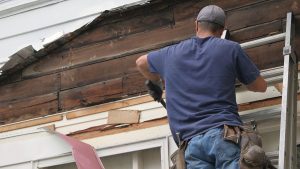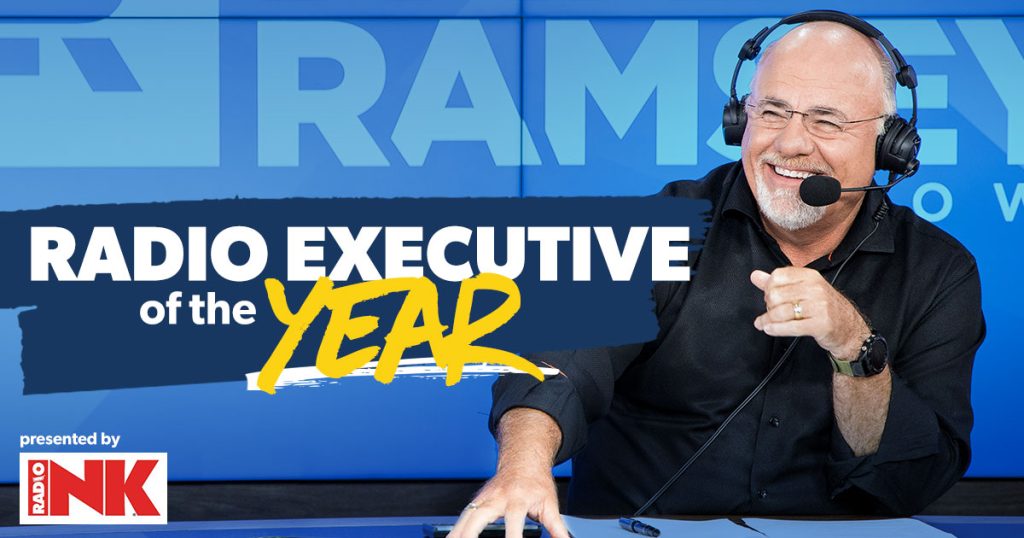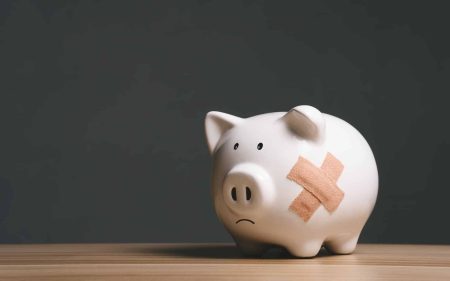Despite the pandemic, 2020 was a strong year for Dave Ramsey and Ramsey Solutions. Once it was clear the virus was not going to be a short term issue, Ramsey, along with his team, managed it like a war. In the end, the company was able to avoid layoffs and increase revenue, something few companies across the country were able to do.
Dave Ramsey started as a co-host on a Nashville radio station that was in bankruptcy, back in 1992. By 1996, he was syndicating his show — self-syndicating his show, one station at a time. “Death by a thousand cuts,” he calls it. Today, Ramsey’s show is heard on over 600 radio stations across the country.
Ramsey Solutions employs 950 people, and the network has seven hosts. The 223,000 square foot Ramsey campus sits on 47 acres in Franklin, Tennessee, and a second building is now under construction. Once it’s finished, the two connected buildings will be more than 400,000 square feet. Phase three of Ramsey HQ will be a 50,000 square foot conference center.
Here’s our interview with Radio Ink’s Radio Executive of the Year, Dave Ramsey.
Radio Ink: How has the pandemic impacted you personally?
Ramsey: It scared the crud out of us concerning the impact it had on our business and the families that work for us. We love them. The economic shutdown scared me more personally than the virus did. We’ve had to scramble, fight, and push back from a chaotic mess to keep things moving and keep these families fed.
Radio Ink: What adjustments did you make to keep things rolling?
Ramsey: It was an emotional and financial adjustment, redesigning ways to serve our listeners and customers as quickly as we could. We had entire segments of our business, like live events, just disappear in a fairly short amount of time. We had the Ramsey cruise sold out for a year, and our sail date was March 23 — the worst possible date you could’ve been out on a boat. It didn’t sail. That was a $15 million top line that evaporated. We had to make sure everyone got their refunds.
Then they started dropping like flies, and we had to send everyone home for six weeks. We’re all back in the office now.
Entire segments were disappearing on the one hand, and on the other we in leadership are working every day trying to figure out a way to replace that revenue. We found ways to serve our customer base and ended up OK, but it was tenuous.
Radio Ink: When you realized this wasn’t going to be a short-term thing, how did you redesign the business? How do you manage through that?
Ramsey: We have a 14-person operating board. These are the actual people who work, lead, and run the business. We had them and five or six more in a room and started every day with two hours of updates — updates on revenue from the last 24 hours, key performance indicators.
We were watching everything we could as if we were in a war. In a sense, we were. What can we deploy this afternoon? A new product or new way of doing things? How can we help our advertisers adjust, help our endorsed local provider program, etc. We had to be leaders. What can we deploy by Friday, by next Wednesday? We were day by day, hour by hour. We got very tactical. The strategic long-term planning went out the window.
Radio Ink: Did this impact the new campus?
Ramsey: No, we had been in it almost a year when this happened. We do have a second building being built that will be ready by May. It didn’t impact it at all. We were preserving cash, and I pay cash for everything. It’s a $50 million project that’s been paid for monthly as we go along. We considered stopping construction to preserve that cash, but it was one of the levers we could throw. The construction people worked straight through.
Radio Ink: What do callers to the show say to you about how they’re feeling?
Ramsey: These days they’re disgusted. Back then, they were afraid when the stock market took a dive. We explained to people not to cash out their stuff. Don’t freak out. This is a temporary thing. The stock market will recover. People lost their jobs and wondered, how do we batten up the hatches on our personal lives? We were walking them through their per- sonal crises every day on the air. There’s less of that now.
Take control of your money with a FREE trial of Ramsey+ today.
Today it’s more about people pissed off that government is taking their freedom away, or they’re mad at their relative who did or didn’t wear a mask. It’s the divisiveness that this fear has caused. When people get afraid, some of them get mean.
“I’ve gotten the pleasure to get under the tent somewhat with the Ramsey organization over the past several years, and know Dave and many of his team members personally. Every time I walk away from a meeting with any one of them, or interact with them or spend time with them, I have the exact same four feelings: awe, inspiration, commitment, passion. Dave is a businessman with a vision, clarity, and purpose I’ve never seen before. He is amazing, as is the organization he has built. I can’t think of anyone more deserving of this great honor.”
Bob Proffitt, CEO, Alpha Media
Radio Ink: The cases have been going up again. Do you see, as the numbers go up, we might go back to heavier restrictions?
Ramsey: I don’t think the numbers will cause us to go backwards unless someone reinstitutes entire shutdowns to the economy. I don’t know how much more the economy can take. The damage done by the shutdowns to people’s lives, and the number of lives lost due to the shutdowns, far exceeds the virus, mathematically.
We deal with diseases of despair every day and have for 30 years. The number one cause of male suicide is financial, and that’s a disease of despair. We’ve had our hands in those worlds long before the pandemic hit. We see those increases as bad. The folks that were struggling with depression or are bipolar, etc., have been exacerbated. That’s not really being measured in some of the comparisons being done.
We feel we really know what’s going on with this. We’re seeing, recovery wise, that it’s been a factor of how much the local authorities allowed that area to open up and start doing business again. As soon as businesses come back, so do jobs, and then lives start to heal financially.
You have people in California and New York City who are fleeing. One of the untold stories is the huge number of people who have left those states permanently. You can’t get a U-Haul in California right now. Same thing in New York. They’re coming to states that are open. They left for good. We’re going to see a shift in the states where those politicians choose to keep things shut down. The economic recovery is splotchy.
Radio Ink: How are you helping the affiliates and getting in front of the listeners now?
Ramsey: Physically, we’ve not been able to get in front of them because the political climate has shut down events. We’ve done some events in our building and streamed them. We have a thousand people here, and 20,000 streaming. We had venues booked and they would cancel. We’ve got people who don’t want to attend events, and that’s understandable. We’re trying to provide ways they can get to us.
We’ve had a very successful year streaming. We’re planning one now for a book launch for my daughter Rachel Cruze. That will be in front of a small live audience in Oklahoma City and also streamed. We’re trying to go places where we don’t cause too much angst to the local officials.
“Dave Ramsey is probably the sharpest mind in the room — and possibly on the air. He is an incredibly smart businessman who has built a hugely successful and diversified organization. And he’s
a talented broadcaster who counsels scores of faithful listeners with his unique blend of financial advice, support, and, when necessary, a frank and firm reality check.”Deborah Parenti, EVP/Publisher, Radio Ink
Radio Ink: Do you miss being in those markets, with the station employees and the big audiences?
Ramsey: It’s been our stock in trade. I like people. I like our audience. I’m not a prima donna superstar. I like sitting on the edge of the stage signing books for an hour and hearing people’s stories. I don’t get to do that much right now. I like to talk to the heat and air guy in San Antonio who’s been advertising with me there with the local affiliate for 20 years. We’re big on local advertising and small business.
Over the years those folks in the radio station and the advertisers have become friends. We see them during an advertisers’ lunch event. Depending on the radio company, they may not be back in their offices at this time, so we can’t do that.
Radio Ink: What has the radio industry meant to you over the years?
Ramsey: It was the way I could connect to people I wanted to help. Over the years getting to know people in the business I’ve developed friendships with some high-quality executives in these companies. The business has a lot of soul to it. There are some characters in the radio business, but you have that in any business. I love radio, the people, and our audience. I am glad I did it.
Radio Ink: In the past year we’ve lost a lot of jobs in this industry. Were you surprised by that?
Ramsey: No. Everybody has taken a hit. We were able to pivot our advertisers’ messaging to where they didn’t lose effectiveness with advertising, and we lost only one advertiser. Overall, our revenue is up year-over-year.
We were able to hold that line. Most places, their corporate offices sent people home and they lost their ability to do those kinds of things and save them.
In some cases the people that were trying to save the advertising couldn’t, and so, with revenues going down, so go jobs.
We told our team we had to keep the revenue above the expenses and payroll; if not, somebody would have to go home. We didn’t want to do that, but we were open with our team. People had to make very hard choices.
“Our relationship with Dave Ramsey runs so much deeper than being just an affiliate. We feel like we are truly business partners, confidants, and even friends with Dave and his incredible team.”
Gordy Rush, Vice President, Guaranty Media
Radio Ink: You talk about the importance of not getting distracted and staying on top of business. Any tips on how to keep staff in that operating mode?
Ramsey: Overcommunicate. Tell them what’s really going on. They aren’t children, they’re adults. Some will react poorly no matter what. We choose to tell our people the unvarnished truth — good, bad, ugly: “Here’s what we can work on to pull the wagon over the hill.” The number of people I’ve talked to who’ve not heard a word — and that’s any business, but it smacks of lack of leadership and courage.
It’s a courageous act and an act of mental health to stand on a stage, or to call everyone saying, “I heard you tested positive, how are you? How’s your family?” Just follow through and talk to people. Just care about them, and they’ll sense that. Even if you aren’t able to hold on to them because revenue goes away, at least you’ve done the right thing in terms of dignity for them and you.
Radio Ink: In June of 1992 you hosted The Money Game with two co-hosts for free because the national station needed to fill time and make payroll. Had the station not had financial issues, do think you’d be hosting a talk program?
Ramsey: Is that not the greatest irony? The Dave Ramsey Show started on a station that was in Chapter 11. Gaylord bought it out of bankruptcy, they sold it to Citadel, and they were bought by Cumulus. Cumulus owns it today. It was WTN here in Nashville. That was our flag- ship station for 20 years. It’s a 100,000 watt stick.
A couple of hillbillys go on the air with a twang. We wouldn’t have gotten on the air with a legitimate radio station. Roy Matlock was the co-host; he was an insurance guy. When we syndicated, the regulators started raising Cain because he was still licensed, so he had to quit. The other guy was doing a real estate hour on Friday; his name is Hal Wilson. I used to buy and sell houses with Hal. He’s passed away since. Roy is back out there doing mutual funds.
Radio Ink: Was this your long-term goal? Did you know what you wanted to do then?
Ramsey: No. We went on the show to try to help people. I had a self-published book I thought I could sell. Roy thought he would get some leads. We were both right, but I wasn’t making a living. It was a fun thing to do. Once you get in front of the mic, you enjoy it. I’m a ham. I like people. It’s an intimate medium. You can tell what people are thinking by the pauses in their voice pattern, changes in their tone, and words they choose. It’s been a really fun ride.
“Over our 20-plus- year relationship I have seen Dave build a world-class organization based upon his passion, dedication, loyalty, and commitment to serve others that is unparalleled in the industry. During this time he has become a mentor and a guide for me and I have tried to emulate his principles in all that we do. There are no words to express the depth of our admiration and appreciation to have the opportunity to work with him and his team, and I can think of no one more deserving of this award.”
Jeff Zander, Jeff Zander Insurance, 21-year Dave Ramsey advertiser
Radio Ink: At some point you decided you would self-syndicate, and it worked like no one else has been able to do it. How long before you knew it would be big?
Ramsey: I’m still kind of wondering. The problem is we’ve done this, in most cases, one station at a time. In some cases we could get three stations. But we never had that 40-station contract. We didn’t get the big guys because they didn’t own us and they weren’t going to do it, which is understandable. We got a little station in Oakridge, Tennessee, and one in Russellville, Kentucky — both are podunk, nothing sticks. They were sweet stations but didn’t have many listeners.
Then we added Jackson, Mississippi, which was legitimate, and Spokane, Washington, which was a great clear. We started calling radio stations and talking them into it. Lots of people said this wouldn’t work without a Westwood or Premiere to get these clears. I said, “I don’t think we’re going to do that.”
One at a time, we talked them into it over 30 years. Now we have 620 stations. On mainstream radio, we have about 10 million listeners, and another 8 million with the podcast.
Radio Ink: Do the big guys call you now and say, “We made a mistake”?
Ramsey: No. We’ve had discussions with the groups, but by and large they decentralized the decisionmaking to the local station. The local station needs to do what they need to do. Occasionally the group will cram down one of their products to the stations, but we haven’t run into that in a long time. Most of the time the folks at the home office are friends of ours now, and they trust our ability to serve their local affiliates, so they’re OK with us being on the station.
If we determine with the local people they have a slot we can do better in than what they’ve got on, we talk them into it. That’s basic syndication. We need to serve them better than what they’ve got on the air, and convince them it will. We’ve been able to prove that, with ratings and doing local endorsements, we can help them get some revenue in the door that others can’t or won’t do.
“Dave has been one of the strongest influences in my life for not only how to lead with excellence, but how to do business the right way. He taught me to always remember that no matter what, people matter. He has instilled in me the fact that if you do enough of the right things, the money will take care of itself. I value my relationship with Dave as a leader, a mentor, a brother-in- arms, and a friend. I am so proud of this acknowledgement as Radio Executive of the Year because it further validates what we at Ramsey Solutions have known for years.”
Brian Mayfield, EVP/Operating Board Member, Ramsey Media
Radio Ink: How has your show evolved over the years?
Ramsey: I’m loving it. We have six other people who speak and write books, etc., and I would have them on as guests, occasionally have one of them pop on. During the pandemic, I put them on as co-hosts, one at a time. When the worst of the pandemic was over, we just kept doing it, so this year the show has changed. I’m using a co-host now for the first time in 20-plus years.
I’m enjoying it a lot. The quality of the show has gone up. You can listen to me, and I’m pretty quick on the draw. I can keep the stuff compelling, but when there’s two of us in here mixing it up, coming at it from different angles, they add flavor to the gumbo. I think the show is better now than it’s been in a long time.
Radio Ink: What would you say to someone who wants to do what you did?
Ramsey: It would be a set of challenges with different players. By the time I got started good, it was group-controlled. Clear Channel, now iHeart, they’re making a decision whether we get on their stations. Citadel, later bought by Cumulus, and all the others, they’re still there. They own their own talent base with the Rushes, the Seans, the Shapiros. They’ll put their people on their inventory.
You have to look at the time slot you’d select to go into and decide what’s it going to take. If you do excellent radio, even if you do that on a podcast, somebody will look at you. Ben Shapiro has proven that. He had a highly successful podcast that made the jump into radio.
Talent will not be denied. You have to bring a product to the airwaves that’s compelling. I wouldn’t wish it on anybody to do it the way I did, one at a time. It’s a lot of work. The net result is a big deal. We won death by a thousand cuts.
“Dave is not only an incredible radio personality, best-selling author, and successful business leader, but his gift as a teacher has helped so many radio executives like myself to be better leaders and managers. I feel fortunate to know Dave for so many years and to have had the privilege of being exposed to his wisdom. His impact on the radio industry and, specifically, my business goes so far beyond just the programming he provides. The giving of himself is at the core of who Dave Ramsey really is.”
Tim Feagan, President, West Michigan Markets iHeartMedia Markets Group
Radio Ink: You’ve mentioned podcasts, books, etc. What other things do you have in the hopper?
Ramsey: The other hosts all have podcasts now. The Ken Coleman Show is on 58 stations. He answers questions on how to get people in the sweet spot of their career. He is doing really well; he’s a compelling host. We’ve built the Ramsey Network that all six or seven of us are putting out in various forms or formats, whether that’s SiriusXM or podcasts or mainstream radio or YouTube — which is a great way to get your foot in the door.
We’ve found all these different methods of delivery, and there’s very little cannibalization. The average YouTube viewer on The Dave Ramsey Show is 23 years old. I’m not getting them on a Talk radio show, I’m getting a 50-year-old there. I’m not cannibalizing the AM Talker getting a 23-year-old on YouTube. A rising tide is raising all ships.
Literally, the 23-year-old’s grandfather might be listening to me every day on great AM Talkers all over America, but they can talk with their grandchild who’s been watching Debt Free Screams on YouTube. I get 16 million views on our YouTube channel every month. It’s a whole different market.
I’m not married to one of these things. We do everything. It raises the brand and helps everyone involved, including our affiliates. The second thing it does is help people on the other end of that voice, and that’s what we’re here for.
Radio Ink: What do you think will happen in 2021?
Ramsey: I don’t have any idea. I didn’t think this would take this long to blow over. I’m an eternal optimist. I didn’t think Americans would be bossed around as long as they have. I think there’s a whole group that’s done with this. I hope it resolves quickly, maybe a vaccine sets people free so the economy can get going.
I will say overall, whether it is 2021 or ’22, it will pass. Americans are resilient. People are not going to lay down and die. They’re going to find a different way to do things. I don’t know exactly what it’ll look like. I never dreamed I’d have to go through an entire body scan to get on an airplane, but we accept it as part of our culture after 9/11. No one would’ve thought that normal prior to 9/11. We’re going to see some things change, but I think it will be great. There will be some winners and losers, just like always.
“It would be easy to speak to Dave’s leadership qualities, his organizational development skills, and the incredibly talented team he’s put together, not to mention being a world-class radio talent, but there are two things that most impress. Dave has off-the-charts grit. His journey, starting on one radio station and selling books out of the trunk of his car, to now, is incredible and truly inspiring. Overcoming life’s obstacles is at the heart of Dave’s content, and he can speak to that; it’s honest and authentic. He also takes great pride in serving others. Dave is simply a good human being. He’s genuine. There’s no question he’s proven that success follows those who help others.”
Kevin Godwin, SVP, Townsquare Media
Radio Ink: Does it ever freak you out that so many people depend on what you’ve built?
Ramsey: Yes, it did this year. I knew I would be OK, but it would be a shame to have to start over rehiring people because I couldn’t keep revenues up. I love all the people in the building. It was scary. I felt the weight of the responsibility. Our job as leaders is to serve. If they don’t, they’re by definition not a leader. Leading is not an entitlement, it’s an act of service. If you don’t feel the weight of it, you probably have the wrong perspective on what leadership is.
Radio Ink: What’s your ultimate goal with the company?
Ramsey: We are continuing to enter different segments. Obviously, we started with the money segment. We’d like to add some personalities in the parenting area, marriage area. We help people with their lives and show them a clear path to healing, transformation, to be better in their lives.
I want to do it in some areas we’ve not done before. It will always be with common sense, with God’s and grandma’s ways of doing things. There’s a shortage of common sense in every area, so there’s always a market for it.
“We couldn’t be more excited for Dave to receive this well-deserved recognition. He has built an incredibly successful business by providing people hope and the tools to live a more rewarding life, while also developing a culture of hungry, humble, and smart professionals. It’s absolutely inspiring, and we’re proud of our tremendous partnership with him and his team.”
Scott Sutherland, Market Manager, Bonneville Phoenix
Radio Ink: Pandemic aside, what does Dave Ramsey do to stay positive? What motivates the motivator?
Ramsey: I haven’t done as good a job this year as in recent memory of making sure I had some margin to refill my emotional and spiritual tank. If you run up against the wall all the time, you eventually burn up. I reached the end of my tank this summer. I had to go to my lake house to sit on the dock for the day and cry a bit. Then I sucked it up and got back to work.
Leaders need to do self-care so they don’t lose their ability to lead. When you get fatigued, that’s when people do stupid stuff that ends their career, marriage, or their lives. You have to give yourself some breathing room and refill your tank.
I looked up and I had gotten the fattest I’d ever been. I went on a whole regime and lost 38 pounds in the last 27 weeks. I haven’t missed a day running or walking. I had to get back on an exercise plan. When I get stressed, it gives me permission to eat an entire box of doughnuts, and I did. It was ridiculous. I’m the lowest I’ve been in a while, which has helped me a lot.
Prayer time and time with family has to be something you do to get the margin or gas in your tank so you have the capacity to lead and love. People get mean and nasty when they’re running low, and that’s what’s happened this year. They’re afraid and they got fried.
Read the full article here










